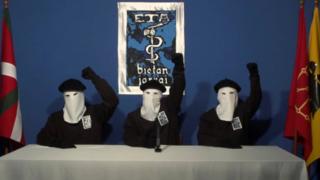 Image copyright
Image copyright
Reuters
The Basque armed organisation Eta is expected to announce its dissolution next month
The Basque armed organisation Eta has apologised to the victims of its decades-long conflict for independence, just days before an expected announcement of dissolution.
The group asked for “forgiveness” for killing people without “a direct participation in the conflict”.
Spain’s government said Eta was defeated politically and operationally and did not achieve any of its goals.
Eta killed some 800 people and wounded thousands more in 40 years of conflict.
The group, which waged a bloody campaign for independence for seven regions in northern Spain and south-west France, is expected to announce its dissolution early next month.
“We are aware that during this long period of armed struggle we have created a lot of pain, including many damages for which there is no solution,” the group said in a statement published in two Basque newspapers.
“We want to show respect for the dead, those injured and the victims that were caused by the actions of Eta… We truly apologise,” it added, admitting its “direct responsibility” in the “disproportionate suffering” in the Basque country.
The group also said it was committed to moving forward with the process of reconciliation in the Basque country.
In September 2010, Eta announced that it would not carry out further attacks, and it declared a permanent ceasefire in January 2011.
In April 2017 the militant group revealed the locations of its weapons caches and said it had completely disarmed.
Image copyright
AFP
Eta carried out many attacks including the one which killed Spanish Prime Minister Luis Carrero Blanco in 1973
Eta first emerged in the 1960s as a student resistance movement bitterly opposed to Gen Franco’s repressive military dictatorship.
Under Franco the Basque language was banned, their distinctive culture suppressed, and intellectuals imprisoned and tortured for their political and cultural beliefs.
Gen Franco’s death in 1975 and the transition to democracy brought the region of two million people home rule.
Many of those who were killed were members of Spain’s national police force, the Guardia Civil, and both local and national politicians who are opposed to Eta’s separatist demands.
Basque group Eta apologises to victims ahead of dissolution

